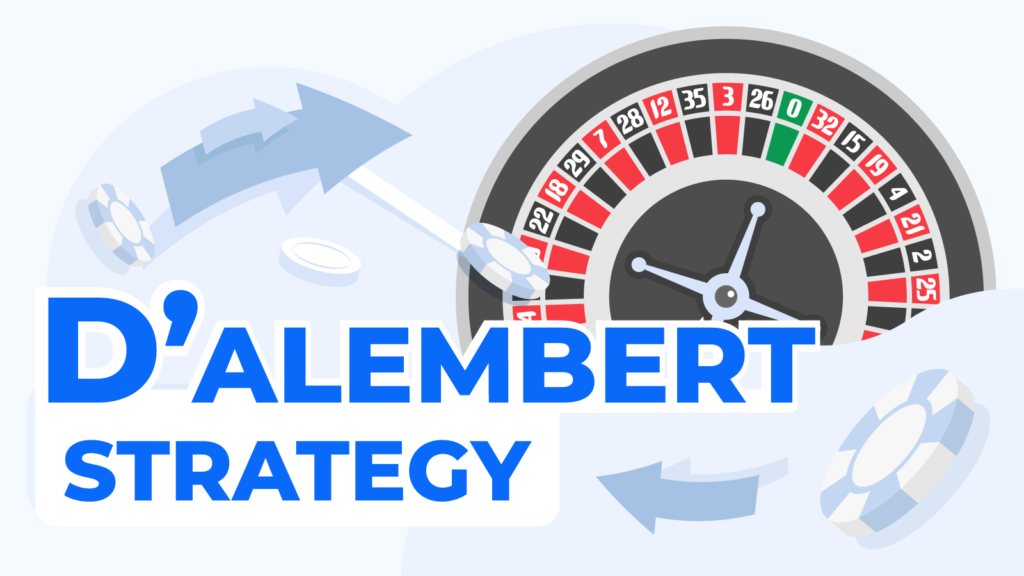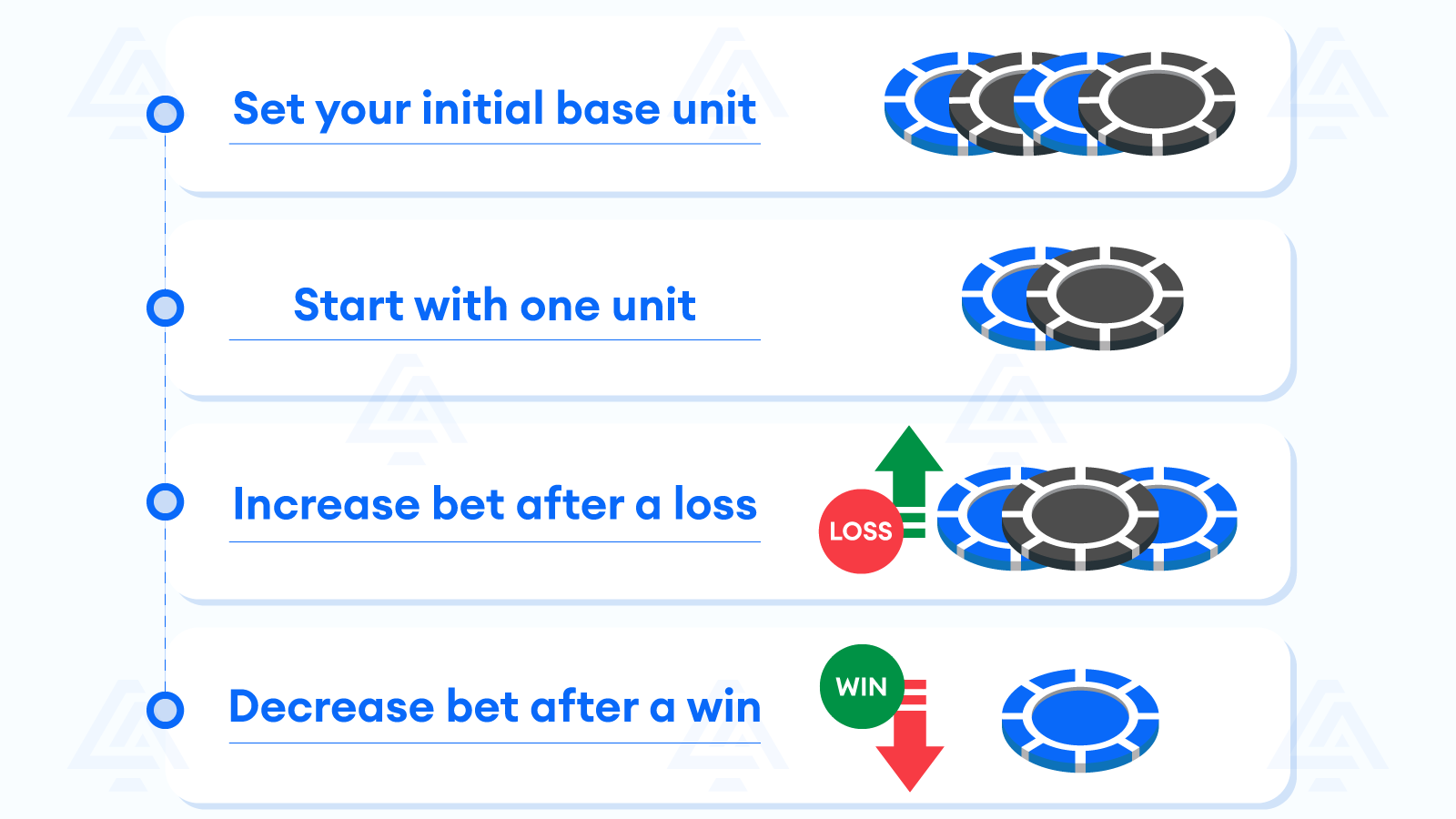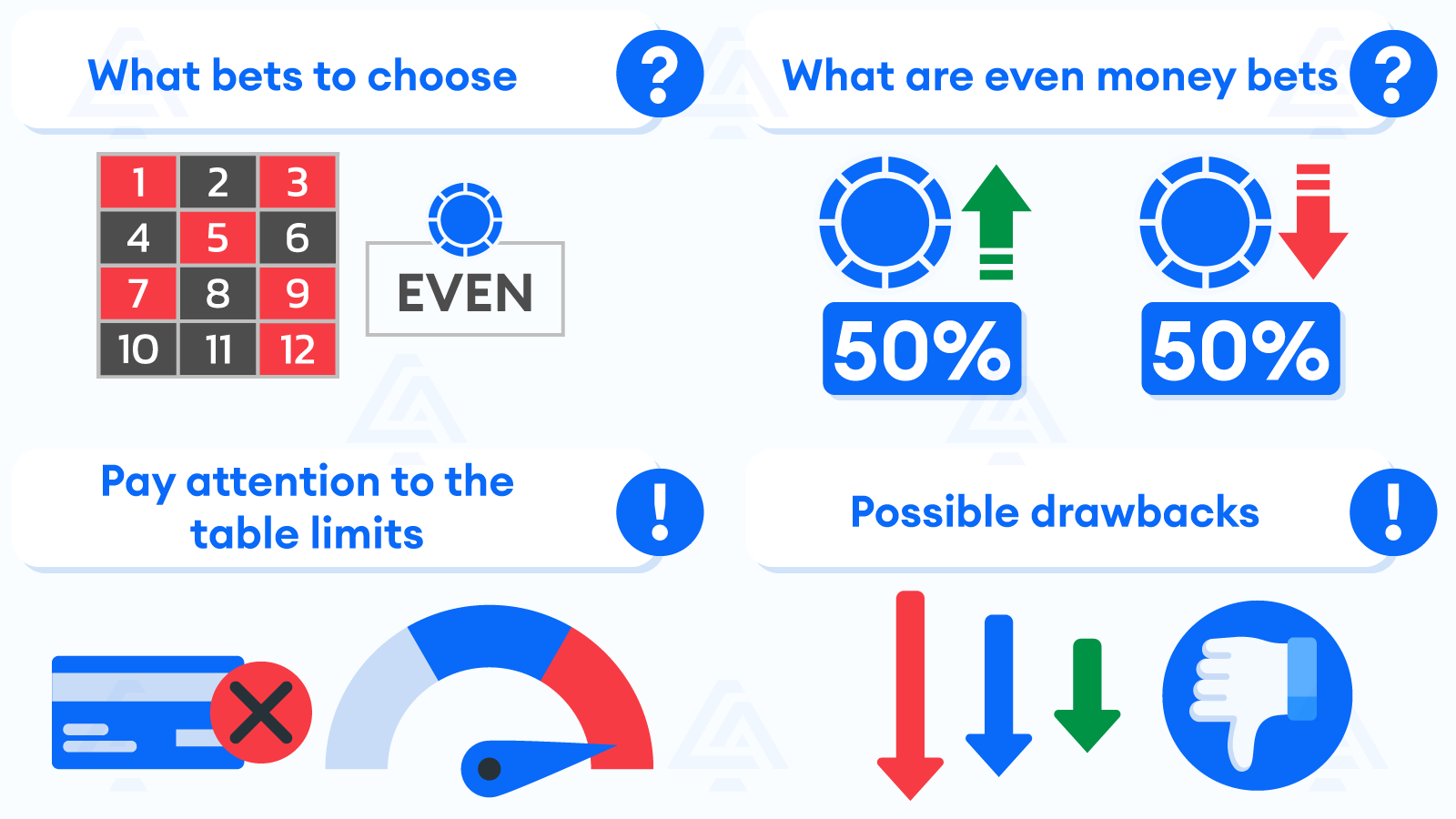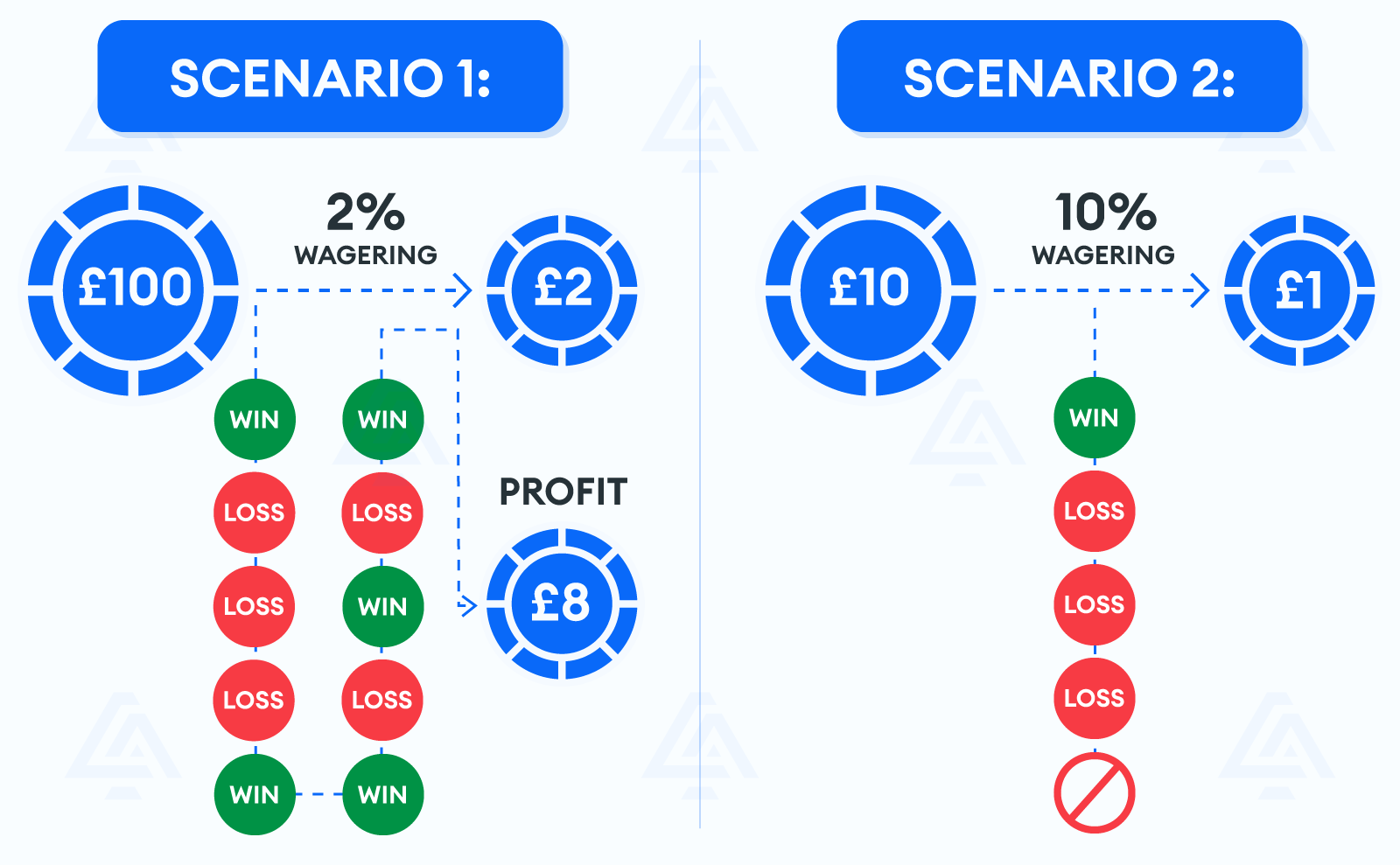
The d’Alembert System Explained for Roulette
The d’Alembert system in Roulette is a strategy to optimize even-money bets and minimize your losses. Our experts explain how and when to apply it.
Here’s what we present in this article:
- The basics for the d’Alembert method imply increasing or decreasing your bet by 1 monetary unit after a loss or a win.
- Part of the d’Alembert method is to not change your bet if the result is a tie.
- This method is a negative progression.
- It is less aggressive compared to other negative progression.
- We recommend this method to occasional players and experienced high rollers.
- How you should set your initial base before you calculate your d’Alembert bets according to your experience.
- How to apply the d’Alembert practically, including how to evaluate bets before using them, and how to use Roulette table limits.
- We discuss the particular case of the European Roulette, and how this progression applies to it.
- The drawbacks of this method include the case in which you need to place consecutive maximum wagers in a round.
- We explore the two major scenarios for using this method, and the odds and strategies related to each scenario.
- Professional tips for applying this method with different budgets and on different variations.
We expand on the details below:
The Basics for the d’Alembert Method
- Bet 1 unit more after each loss;
- Bet the same amount if your previous wager resulted in a tie;
- Bet 1 unit less after each win.
Alternative negative progression Roulette strategies:
- Similar to the Martingale Roulette strategy, the Labouchere system and Fibonacci Roulette system, D’Alambert involves a negative progression.
- Comparing it to all these other systems and even with the Romanosky strategy, it is much less aggressive.
- That makes the d’Alembert method ideal both for casual players and high rollers.
How to Use the d’Alembert System

Set your initial base unit with a few steps:
- Determine your base betting unit by dividing your bankroll into equal parts.
- Only then can you start calculating your D’Alembert system bets.
We do recommend specific unit sizes, depending on your proficiency:
- Start with one unit. Your one-unit wager will be the first bet in a cycle of bets that follow according to the progression rules.
- Since you are just starting with the strategy, we recommend going for 1-2% of your total bankroll.
- When you thoroughly learn the hang of it, you may go for up to 5%.
For example, your bankroll of NZ$500 would be divided into parts or units of 2%.
In that case, 1 unit would be 2% of NZ$500 = NZ$10.
So, your first bet would also be NZ$10.
Be aware
If you don’t follow the progression rules and wager amounts by the book, you risk facing negative results. That holds for most gambling strategies and guides we present.
You should increase your bet after a loss:
Suppose your wager is lost. In that case, you must increase your next stake by 1 unit.
In keeping with the above example, your next wager would be NZ$20.
If your bet results in a tie, you should repeat the same stake for the next round.
Let’s explore ties in Roulette:
A tie is when, for any reason, you get your wagered money back.
It may happen due to the ‘En Prison’ rule of French Roulette, but not exclusively.
According to our research to update our NZ live dealer casinos page, most of the best sites will state in their terms that they return money on certain bets when technical errors occur.
You should decrease your bet after a win.
The second core rule of this betting system is you must lower your stake after a win.
Important
Remember the progression. Keep increasing your stake or decreasing 1 unit as long as your winning or losing streak continues.
A Practical Guide to the d’Alembert System

- Choose carefully your bets for the d’Alembert Roulette strategy
- Evaluate even-money bets before you use them
- Pay attention to the table limits for your progression
- Consider possible drawbacks of d’Alembert
What bets to choose for the d’Alembert Roulette strategy:
Our gambling experts believe that the d’Alembert system works best with bets that give you the highest chances of winning.
Since they give you almost a 50% chance of winning, even-money bets are the ones most commonly used for this strategy.
Evaluate even-money bets before you use them:
Even-money bets may seem like tossing a coin for the uninitiated.
You always stand 50%-50% chance of winning because the event is equally likely to happen. Or at least that’s how it seems.
However, Roulette is a bit different. Your chances are only roughly equal when you place even money bets.
Important
Remember the 37 Roulette numbers include the infamous 0, accounting for your Roulette casino’s 2.7% house edge. On any Roulette spin, Red numbers would appear approximately the same number of times Black numbers would appear in a Roulette game.
And the same would happen with outcomes like:
- Evens/Odds
- High/Low numbers
Pay attention to the table limits for your progression:
Usually, casinos attach wagering limits to their Roulette tables in the spirit of responsible gambling or to prevent players from using progression betting systems entirely.
Several online Roulette sites listed on our website forbid Roulette betting strategies as cheating. Fortunately, there are enough options on the market with a more player-centered approach.
Tips
Check your casino’s Terms or ask the casino helpdesk operators to explain their policy about staking strategies in Roulette games. That way, you can easily prevent a letdown if the usage of betting systems turns out to be banned or frowned upon.
The approach of European Roulette casinos is sightly different
European Roulette casinos have a more liberal approach to Roulette strategies.This may be due to the differences between American and European Roulette if we look specifically at house edge differences.
We’ve seen a significant percentage of online casinos limit outside Roulette bets to 10% of the table’s limit in some games.
Look into our expert European Roulette guide to understand more about the applicable bets.
Consider possible drawbacks of d’Alembert
Suppose we’ve found a high rollers’ live Roulette table with a NZ$5000 maximum betting limit.
The player in this scenario is on a losing streak.
At some point during the progression, there’s a chance that they must wager NZ$5000 or more during the next round.
If that’s the case, the strategy becomes ineffective because you’re forced to win consecutive max bets, which is impossible.
Recommendation
We strongly suggest you only increase your base unit when you get more experience with this method. By starting with lower betting units, you can reduce the risk. So, keep your unit at 1% when you are at the beginning.
How the d’Alembert System Works
The d’Alembert system works differently depending on the scenario you are in. Typically, there are 2 scenarios:

Scenario 1: when the system works
- Starting bankroll: NZ$100
- Betting unit: NZ$2
- Number of rounds: 10
| Round number | Betting decisions | Round outcome | New bankroll |
|---|---|---|---|
| 1 | NZ$2 | Win | NZ$102 |
| 2 | NZ$2 | Loss | NZ$100 |
| 3 | NZ$4 | Loss | NZ$96 |
| 4 | NZ$6 | Loss | NZ$90 |
| 5 | NZ$8 | Win | NZ$98 |
| 6 | NZ$6 | Win | NZ$104 |
| 7 | NZ$4 | Loss | NZ$100 |
| 8 | NZ$6 | Win | NZ$106 |
| 9 | NZ$4 | Loss | NZ$102 |
| 10 | NZ$6 | Win | NZ$108 |
- Suppose you claim an offer from a live casino on our list
- Your original NZ$50 deposit becomes NZ$100 due to a 100% matchup
- You pick the recommended 2% unit (NZ$2) and start wagering
- The first bet was a win, so you’ve got a profit of NZ$2
- From then on, you continue with the D’Alembert method
- After 5 winning and 5 losing outcomes, you still come out with a profit of NZ$8
Scenario 2: when the system doesn’t work:
- Starting bankroll: NZ$10
- Betting unit: NZ$1
- Number of rounds: 5
| Round number | Betting decision | Round outcome | New bankroll |
|---|---|---|---|
| 1 | NZ$1 | Win | NZ$11 |
| 2 | NZ$2 | Loss | NZ$9 |
| 3 | NZ$3 | Loss | NZ$6 |
| 4 | NZ$5 | Loss | NZ$1 |
| 5 | N/A | N/A | NZ$1 |
- Now imagine you’ve claimed some registration no deposit money from our latest verified casino addition
- You have NZ$10 to play Roulette and your unfortunate unit is NZ$1
- At the same time, it represents a whopping 10% of your bankroll
- After a mere 4 rounds of Roulette gameplay, you cannot apply the strategy further
- It only took 3 consecutive losses and you’ve exhausted your bankroll
Play like an expert:
- This scenario showcases what may happen if you don’t have a proper budget plan
- It’s vital to keep your unit size on the low end (1-2%) to prevent draining your funds too quickly.
- With a 10% unit size, no matter how large a bankroll, the same would have occurred
- Try to see each bet as a percentage amount of your bankroll, not as the actual monetary amount
Odds for a crushing streak of losses:
In European Roulette, the odds of losing an even money bet are 19/37.
Let’s take an example:
- Suppose you bet 1 unit on Red/Black
- The ball has 19/37 odds to land in the green zero pocket
- So, the chances of losing by betting on Red/Black are 19/37
In other words, there are 19 ways to lose out of 37 possible outcomes
The chance of having three consecutive losses with Red is calculated as follows: 19/37 x 19/37 x 19/37 = 6859/50653 = 1/7.38
On average, that means you will encounter 3 consecutive losses with even-money bets once per every 7.4 streaks.
The d’Alembert Roulette betting system cannot curb the house edge.
It is essential to remember that no Roulette systems can influence the house edge of your bets.
The casino will still take their 2.7% cut from a live European Roulette variation or as low as 1.35% with certain bets in French Roulette.
Important
A Live Casino’s RNG entirely determines the result of any Roulette spin. The guaranteed randomness makes it fair. While you can experience a series of wins, it is not uncommon to find yourself on a losing streak.
CasinoAlpha’s Tips for the d’Alembert System
Practice with bonuses and only choose reputable online casinos
- Pick a Roulette table with low betting limits
- Understand how Roulette odds work and how to use them to develop the right strategy
- Keep in mind that large live casino bonuses may not be eligible to use in high-stakes rooms
- Set your initial bet and bankroll and remember the recommended range of 1-2% per stake
- Now it’s the best time to set up your responsible betting limits
- Start with the smallest unit allowed at the table
- Don’t look for patterns in winning numbers and avoid the gambler’s fallacy
- Create a safety net by choosing cashback bonuses to get back some of your losses in case they occur
- Test the system using demo versions and study before playing with real money
We strongly advise you to first study the Roulette European wheel, since that’s the most commonly featured online.
Have you ever employed this method?
If you have employed this method in your game, leave us your impression in the comment section below! Also, we welcome you to leave us some tips to improve the overall gambling experience, with this strategy.
















